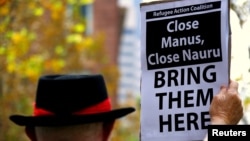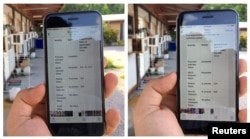U.S. officials have stopped screening refugees for potential resettlement in the United States but will return to the Pacific atoll of Nauru to continue working toward a deal that President Donald Trump has condemned as “dumb,” an Australian minister said Thursday.
Immigration Minister Peter Dutton would not say when U.S. Department of Homeland Security officials would return to Nauru to conduct what Trump describes as “extreme vetting.”
Trump made enhanced screening a condition for agreeing to honor an Obama administration deal to accept up to 1,250 refugees refused entry into Australia. Australia pays Nauru and Papua New Guinea to keep more than 2,000 asylum seekers, mostly from Iran, Afghanistan and Sri Lanka, in conditions condemned by rights groups.
The process of “extreme vetting” has yet to be explained.
US leaves under a cloud
U.S. officials were sent to Nauru within days of the deal’s announcement in November after the U.S. presidential election. But they left this week with arrangements under a cloud.
“I don’t have any comment to make in relation to when U.S. officials will be on Nauru next,” Dutton told reporters. “There have been officials there who have left ... in the last couple of days and we would expect other officials to be there in due course.”
“But there is a lot of work being done at an officials level with people from my department and the Department of Homeland Security and the Department of State in the U.S., but it’s not something that I have anything to comment on,” he said.
1,600 refugees
Australia has determined that there are 1,600 genuine refugees among 2,077 asylum seekers on Papua New Guinea and Nauru. There could also be refugees among the 370 asylum seekers who came to Australia for medical treatment then took court action to prevent their return to the island camps.
About 1,240 asylum seekers live in the camps while the rest of those on the island live in communities outside the fences.
Dutton could not say whether the 1,600 refugees would pass the new U.S. vetting regime.
“It’s an issue for the United States under the agreement as to who they take and the way in which they conduct their vetting, so I don’t have any comment in relation to the U.S. process,’’ Dutton said.
“Our desire is to get people off Nauru and Manus as quickly as possible,’’ he added, referring to Papua New Guinea’s Manus Island.
Most vulnerable given priority
As of last week, Nauru held 1,132 asylum seekers including women and children. The Manus facility houses only men.
Australia has said the “most vulnerable” refugees on Nauru would be given priority for U.S. resettlement.
After committing to Prime Minister Malcolm Turnbull that he would honor the agreement, Trump tweeted that it was a “dumb deal.”
Asked last week whether the deal would continue, Trump said: “We’ll see what happens.”





